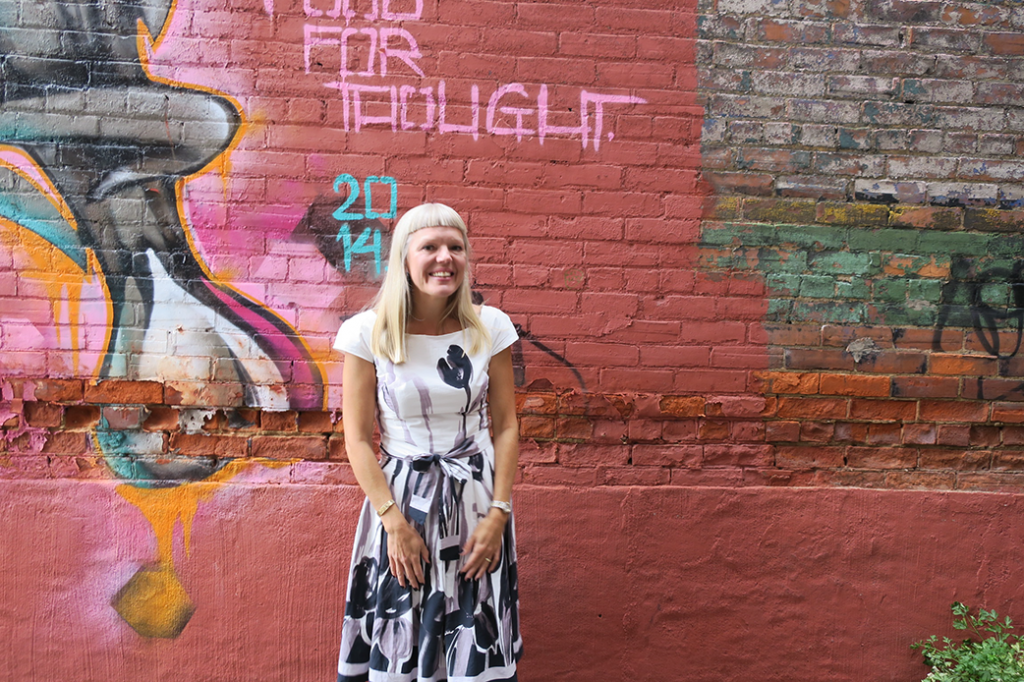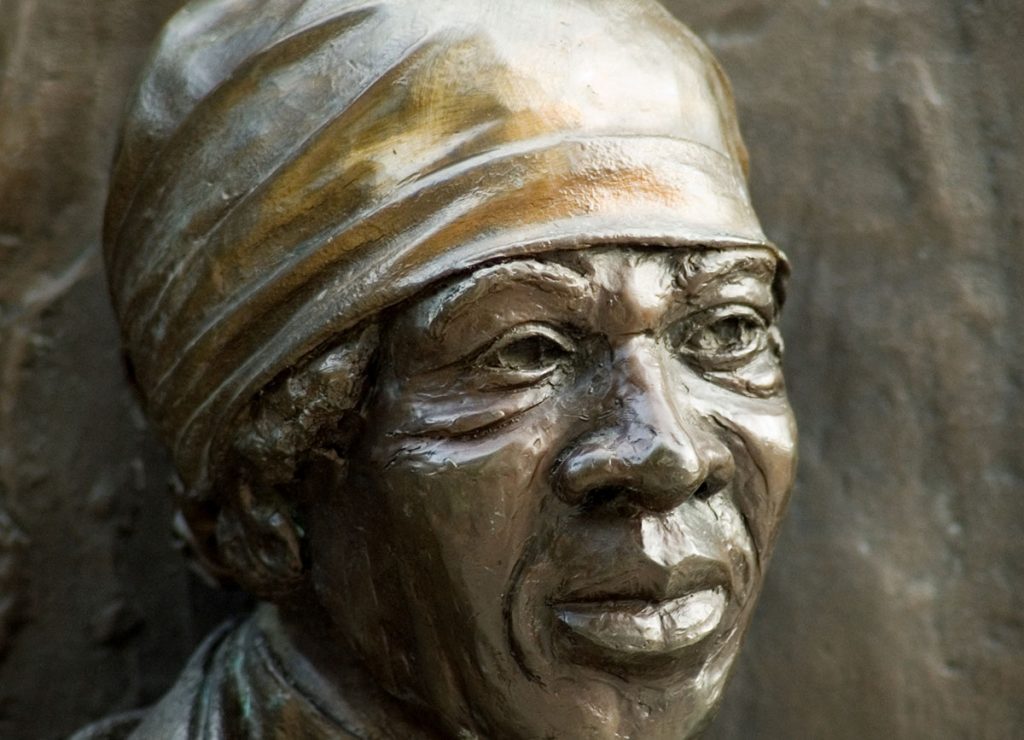
Vancouver-based Lunapads recently became a 2016 Canada Post E-Commerce Innovation Award-winner in the category of Community Impact. Lunapads opened for business in 1993. The company survived the rollercoaster startup phase and today it is a successful, seven-figure feminist enterprise with thousands of customers worldwide. It also boasts two innovative social impact programs, One4her, which improves access to education for Ugandan girls, and G Day For Girls, a global social movement involving “rite of passage” events that celebrate and empower girls aged 10 to 12 who are transitioning to adolescence. Lunapads is a She-EO venture, and is on BCorp’s Best for the World list which highlights the top 10% most highly ranked B Corps globally.
LiisBeth had the opportunity to meet with the company’s Co-founder, Creative Director, and feminist entrepreneur, Madeleine Shaw on Sept. 23.
LiisBeth: Tell us about Lunapads.
Shaw: Okay, Lunapads is a for-profit, Vancouver-based social impact business. We’re a founding Canadian B Corp. We specialize in natural menstrual products and also products that meet bladder leakage needs. We are all about helping individuals have healthier, more positive experiences and outlooks about things their bodies do, getting rid of the shame some people feel when it comes to topics like menstruation, postpartum needs and leakiness.
LiisBeth: We want to learn more about you as a feminist entrepreneur, which you so totally are! First, what does feminism mean to you?
Shaw: Feminism, to me, is just about a movement that strives to achieve social equality. For me, I came to feminism at around age 17 or 18 as a way to try and make sense of gender oppression I had experienced personally. Learning about feminism opened my eyes to the fact that inequality is something many people experience and that gender equality does not exist in our culture. Girls, women, trans, non-binary people are particularly oppressed under a patriarchal power dynamic. To me, feminism just addresses all of them. It’s a lens through which one sees the world. It helps you see and understand inequality, the power dynamics behind it, and encourages active participation in changing that.
LiisBeth: How did your feminist outlook affect your career decisions?
Shaw: It actually helped me to opt out of the mainstream business working world. Just to back it up, while at university I started taking women’s studies courses. The reason I became interested in women’s studies is because of what I experienced during frosh week at Queen’s University in the mid-80s. I was pushed down onto a muddy field along with all the other first-year girls and the football team did push-ups on top of us. It was like this fake rape simulation going on. I was 17, I was thousands of kilometres away from home. I was shocked and appalled.
Then, the following week, I went into my first English 100 survey class. I wanted to be an English major because I loved reading. But when I looked at the syllabus, I found there was not one single woman writer on the entire syllabus for the entire year. Not one word written by a woman. Not one in the entire history of English literature. My mom has a Master’s degree in English and has kind of schooled me that this was not perhaps an accurate reflection of who is out there. I just thought, “Oh my God, here’s one of, what is supposed to be, the better higher institutions of learning in Canada, and this is their version of reality? I can’t take it!” I went down the hall to women’s studies and more-or-less never looked back.
Later, I got involved as a student leader doing mostly anti-date rape, anti-sexual violence-type campaigns like Take Back the Night and No Means No, and organizing screenings for documentaries like Killing Us Softly. I wanted to create change.
With respect to business, initially, as a university student, I hated the idea of business. I thought that was the last thing I would ever do. I thought it was an inherently exploitative activity that was sort of hand in hand with patriarchy. Capitalism was how patriarchy funded itself basically, right? That was my belief system in the early days. As a person of privilege, I didn’t understand where money actually came from, that people needed jobs and the economy supported families. Later, I started to consider that maybe capitalism wasn’t an inherently broken system but instead an inherently neutral system that had been kind of politically hijacked by a certain kind of person influenced by patriarchal values. Capitalism as a system wasn’t the problem. The values of those in power who had the opportunity to shape and leverage it is the problem.
So, I got excited about the idea of entrepreneurship. I thought, if I can find and create my own business and make it on my own terms with my own values then number one: I don’t have to go up to the 26th floor of some corporation who makes things or extracts things that I don’t believe in and whose practices don’t align with my values.
As a confident feminist, I also figured l probably wouldn’t survive for even a matter of months within that kind of a power system. I’m just a very independent, creative spirit. Entrepreneurship for me was an expression of leadership and creativity that my kind of rebellion. Fuck that! I don’t need to be that [corporate] kind of person. I don’t need to have the big title and the big… whatever. I get to have what I want on my own terms. So when I was 25, I started my first business. I’m 48 now. The idea that I could start my own business was a revelation to me. I was like, “Whoa! This is so exciting!”
LiisBeth: What was your first business?
Shaw: My first company was called Everywhere Designs. As a child, I always loved sewing and textiles. I guess I at first tried to be a feminist fashion designer by making clothes that were comfortable and that I felt celebrated women and that were sustainable, local and just alternatives to mass-marketed, super-sexy kind of things. I love colour, and I wanted to play with making my customers feel more alive and a little more vibrant. Just a way of expressing yourself in an interesting and creative way. So I purchased the small garment manufacturing business that had been making Lunapads, opened a little boutique and did a lot of customer work. Tons! I’ve made so many wedding dresses. Oh my goodness!
Lunapads grew out of that. I was on my own for about seven years when I met my business partner Suzanne [Siemens] in 1999 at a community leadership course. When we first met, I thought she represented the path of the capitalist dark side that I feared. She was corporate. An accountant. But that path almost killed her. She was looking to apply her talents to something that mattered to her. We have now been partners for 16 years.
LiisBeth: As a women’s studies graduate, where did you go to learn about building a company?
Shaw: The venture program at BCIT, though it’s called something else now… Now there’s entrepreneurial education programs everywhere. Back in the day, not so much. It was one of the few. I just loved it. They were great. I think there were maybe 12 or 15 people in my whole class.
LiisBeth: Were there women in it?
Shaw: There were one or two others.
LiisBeth: How has feminism influenced the way you operate your company?
Shaw: For starters, when we hire someone, we always look for a strong fit with our values before anything else. Feminism is one of our corporate values, so if somebody does not identify that way, then they’re going to have trouble fitting in.
LiisBeth: What’s the gender balance of your staff?
Shaw: If you go by the numbers, it would be 90 percent who are women-identified and 10 per cent genderqueer-identified.
LiisBeth: Have you ever had men apply for jobs in the past?
Shaw: Never. We hire them as contractors. We absolutely have amazing business relationships with them. And our accountants are men and our tech guys are men. We have never had any men apply, so it would be hard to hire them. Let’s start there.
But we’re certainly open to it. It has just happened that way, and I think it’s partly driven by the type of products we make, which is not to say that all women menstruate or all demonstrators are necessarily women. We hire feminists.
LiisBeth: What kinds of policies would we see in a feminist company’s employee handbook?
Shaw: We have explicitly written policies around trans inclusion. We offer both maternity and paternity leave. We have a glossary of different terms so people understand what a gender as a spectrum is or what this gender means or what genderqueer means.
We expect and train people to use gender-inclusive language when dealing with customers. For example, if you’re in our social media marketing group, you don’t say, “Hey ladies! Hey girls!” If you are addressing a group of people who do identify that way exclusively, then that’s fine, but if you’re trying to address the wider community of Lunapads, then we’re very particular about using gender-inclusive language.
LiisBeth: Have you gone as far as changing your pronoun language in your marketing material?
Shaw: Yes. When we are speaking generally of our customers, we don’t use the language of “girls” and “women”; we use the words “community” or “individuals” or “people who menstruate.” We’re also working on our imagery. We just did a photo shoot with some trans people so we can be representative visually, and not just verbally, in the copy.
LiisBeth: Let me ask about another area of decision making in procurement. When you’re sourcing suppliers, do you look for women-owned enterprises to deal with?
Shaw: It’s challenging, especially when you’re dealing with textiles, but it’s true in many things. I would say that we look for sustainability first when it comes to supply chain, because we’re trying to work with environmentally sustainable fabrics. Because we’re B Corp, we look for B Corps, so we know their values match with ours. It may not be a specifically woman-owned or feminist organization, but it’s one that has been evaluated for its overall social and environmental impact.
LiisBeth: What about decision making and operating? How flat? How hierarchical? How has, let’s say, feminism, influenced your management practices?
Shaw: It’s interesting because I remember as a university student doing feminist organizing, I actually experienced a lot of frustration in that environment, where it almost felt too collective and too inclusive sometimes, to the point where things just didn’t get done. I would say that we’ve been through some interesting iterations. They say that a company’s culture is a direct reflection of the issues leaders themselves are working through, which is interesting.
A few years ago, we made the conscious decision for my partner Suzanne to be the point of the arrow, which implies this hierarchy.
Can we still be a feminist company and have somebody who is the boss? My answer to that is: I think yes. We’re still living in patriarchal times. There’s no doubt about it. We’re all, to some extent, still carrying around that baggage, but I also believe in efficiency, and I believe that not every decision needs to be collective. It just doesn’t. If you’re going to scale your business it can’t be.
LiisBeth: Feminism is everywhere today. And historically, feminists have an uneasy relationship with capitalism. Where do you see this all going?
Shaw: Let’s start with feminism. I feel more and more like we’re in the age of feminism, finally! People are recognizing the untapped resource of women, in particular from an economic perspective as taxpayers, as workers, and also at the same time we’ve got the climate collapsing due to values-free business practices that are exploitative.
When it comes to feminism and capitalism, I personally believe that the success of the feminist business revolution will be to change capitalism and, I hope, also work to address climate change because it’s our biggest opportunity.
We know the system of patriarchy needs to change, but within that we’ve got the capitalist system. It’s so essential and yet it’s been seized by a few and used in a twisted way. That’s why I believe things like feminist entrepreneurship can make a difference, where we can really take a kick at creating alternatives within the capitalist system.
The act of doing business can be really positive if you do it right. I think that the combination of feminism and capitalism, powered by creativity, can change the world.
Related Articles
“Silicon Valley’s Quest to Make Periods Cool: Feminine hygiene is getting a millennial-savvy update–could it leave some women behind?“
(Publisher’s Note: Lunapads are available at retail stores across Canada including Whole Foods and London Drugs. In the US, Lunapads Performa Pads have just launched at 200 select Target stores, as well as online at Target.com. Our complete collection is available at www.lunapads.com; Liisbeth community members are invited to use promo code lunalove to receive 15% off orders over $35 untilDecember 31, 2016.)











